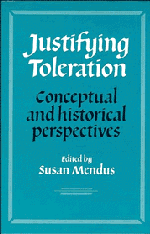Book contents
- Frontmatter
- Contents
- Preface
- Introduction
- 1 Scepticism and toleration in the seventeenth century
- 2 A more tolerant Hobbes?
- 3 Locke: toleration and the rationality of persecution
- 4 Toleration and Mill's liberty of thought and discussion
- 5 Rousseau and respect for others
- 6 The intolerable
- 7 Autonomy, toleration, and the harm principle
- 8 Friendship, truth, and politics: Hannah Arendt and toleration
- 9 Dissent, toleration, and civil rights in communism
- 10 Liberalism, marxism, and tolerance
- 11 Socialism and toleration
- Index
8 - Friendship, truth, and politics: Hannah Arendt and toleration
Published online by Cambridge University Press: 20 May 2010
- Frontmatter
- Contents
- Preface
- Introduction
- 1 Scepticism and toleration in the seventeenth century
- 2 A more tolerant Hobbes?
- 3 Locke: toleration and the rationality of persecution
- 4 Toleration and Mill's liberty of thought and discussion
- 5 Rousseau and respect for others
- 6 The intolerable
- 7 Autonomy, toleration, and the harm principle
- 8 Friendship, truth, and politics: Hannah Arendt and toleration
- 9 Dissent, toleration, and civil rights in communism
- 10 Liberalism, marxism, and tolerance
- 11 Socialism and toleration
- Index
Summary
Many of the classic arguments for toleration of intellectual and social diversity share a paradoxical characteristic, which is that when they are stated in their most effective form they edge close to the spirit of orthodoxy. Consider, for example, the relation between truth and the toleration of unorthodox ideas. At first sight it seems clear, as Preston King says, that while intolerance has a natural affinity with faith that we can know the truth, toleration is naturally linked to scepticism. In fact, however (as King goes on to point out), toleration has invariably been defended as a means to the attainment of truth, and the argument is most effective where it is believed that conflict between diverse views will enable truth to emerge as errors are eliminated.
It is not difficult to see why this argument should have been so popular with supporters of toleration ever since Milton, because it neatly pulls the rug from under the supporters of orthodoxy. Since those who wish to enforce uniformity usually justify the repression of dissent by claiming that they already know all the answers, the counter-argument that diversity is the surest road to truth is something of a rhetorical tour de force. Its weakness is that it seems to concede too much to the orthodox desire for consensus, leaving only conditional and temporary reasons for the toleration of diversity. For if it is the case that toleration promotes the discovery of truth, it seems to follow that what we have to look forward to is not an indefinite continuance of diversity, but rather the eventual achievement of a well-founded unanimity.
- Type
- Chapter
- Information
- Justifying TolerationConceptual and Historical Perspectives, pp. 177 - 198Publisher: Cambridge University PressPrint publication year: 1988
- 2
- Cited by



